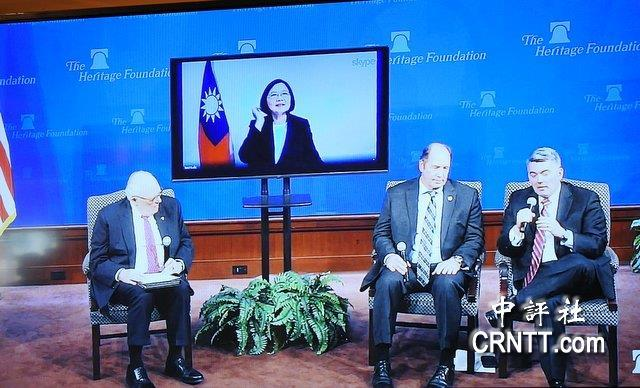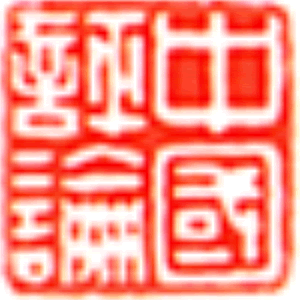
|
| 蔡英文在夏威夷與華府智庫傳統基金會進行視訊會議。(中評社 黃筱筠攝) |
以下為“總統府”提供蔡英文的談話內容:
PART 2:QA Session Moderated by Dr. Ed Feulner
第1題:兩岸關係
我對兩岸關係的立場一向明確,即“我方”須秉持務實態度、維持現狀及持續做負責任的利害關係者。然而這並不容易。
北京持續堅持其想要的“九二共識”、“一個中國”及最終的“一國兩制台灣方案”。北京從未思考過台灣人民所期待的,即維持現有的生活方式及保留在不受脅迫之情況下做決定的權利。
我們必須坐下來,在不設前提的情況下,坦誠討論雙方的共同點。雙方必須先展現善意,才能創造更多兩岸間的長久互信。“我方”堅守此信念,我想我們在全球的朋友與夥伴亦支持這樣的想法。
My position on cross-strait relations continues to be clear:we need to be pragmatic, we need to maintain the status quo, and we need to continue being a responsible stakeholder. They have not made this easy.
Beijing has continued to focus on what they want:the “1992 consensus,” “one China,” and, eventually, a “one country, two systems model for Taiwan.” They have not thought about what the people of Taiwan want, which is to be able to maintain our way of life and ability to make our own decisions, free of coercion.
We need to be able to sit-down and have frank discussions about how we can find common ground without preconditions. Both sides must be willing, as a first step, to show goodwill so that we are able to create more lasting trust across the Taiwan Strait. I remain committed to this, and I think our friends and partners around the world remain supportive of this process as well.
第2題:我與太平洋島國關係
中國確實持續強化在太平洋地區之行動,包括對我們的“友邦”。其目的是爭取這些國家在經濟上、政治上及某種程度在戰略上,與中國更緊密。
美國、澳大利亞、日本及其他利害關係者已逐漸瞭解這個情況,許多理念相近國家也看到了中國的行為對區域在債務、穩定及良善治理方面所構成的挑戰。
這就是為什麼台灣有必要與理念相近國家合作,在太平洋地區創造以價值為基礎的夥伴關係。
我相信當太平洋國家有權利選擇時,它們會偏好與具共享價值與利益的國家合作,獲得援助及投資。
因此,我們會持續強化與美國在私人投資領域的合作,包括透過“海外私人投資公司”(OPIC)。
我們會確保在基礎建設、教育、醫療衛生及農業等領域的援助符合當地人民的實際需求,並尋求機會邀請其他理念相近國家也扮演若干角色。
我們會更加廣泛地分享相關成果,不僅是和當地政府,也包括一般民眾;同時加強反制中國的訊息,分享中國言而無信的真實案例。
我們相信我們的價值體現在與太平洋各國的關係上,我們也希望和理念相近國家合作,建立廣泛的夥伴關係,以維護這些價值。
It’s true that China continues to increase their actions in the Pacific, including in our diplomatic allies. Their purpose is to bring these countries closer to them economically, politically, and to a certain extent, strategically.
There has been an increased awareness of this issue by the US, Australia, Japan, and other stakeholders. Many like-minded countries see the challenge that China’s actions pose in terms of debt, stability, and good governance – issues that are extremely important in the Pacific.
This is why I think it’s essential for Taiwan and like-minded countries to work together to create a values-based partnership in the Pacific.
I believe that when given a choice, Pacific states would prefer that assistance and investment come from countries that share their values and interests.
As a result, we will enhance our cooperation with the US in areas of private investment, including through the Overseas Private Investment Corporation (OPIC).
We will ensure that our current assistance into infrastructure, education, healthcare, and agriculture corresponds closely with the actual needs of their people, and find ways to invite other like-minded countries to play a role.
We will more broadly share the good narrative we’ve been building, not only with their governments, but also everyday people. And on the flip side, cooperate with partners to counter the Chinese narrative, and share examples of areas where the Chinese have not lived up to their promises in the region.
We believe our values underpin each and every one of our relationships in the Pacific. And we want to actively work with like-minded countries to build a broad partnership to ensure that these values are protected.
第3題:安全
捍衛我們2,300萬人民、民主制度及生活方式係第一要務,尤其強化國防力量以具備抵抗侵略的能力為最關鍵核心。
本年已係國防預算連續增長的第三年,為近年首例。這些資金將被用在真正具影響力的國防計劃上,包括不對稱作戰能力、人員訓練及確保“我國”順利轉換至全募兵制。
“我國”正積極建構必要的能力,惟迄未能採購潛艦及教練機。爰“我國”防工業在衰退多年後,今已再度復甦。
我們十分感謝美國持續售我裝備,這些裝備均係經審慎評估,且符合台灣實際需求。“我方”已申購M1坦克及F-16V戰機,當大幅強化“我國”的陸、空防衛能力,提升軍隊士氣,並向世界展現美國防衛台灣的承諾。
此外,“我國”刻投注大量資源進行人員訓練及防衛戰略革新,讓不對稱作戰能力盡快到位,以更有效因應“我方”所面臨的威脅。
整體而言,我盼藉由前述各項作為,確保台灣人民選擇自己的未來,不受威嚇。
My number one priority is to ensure that our 23 million people, democracy, and way of life are well protected. Strengthening our armed forces so that we have the capacity to deter aggression is a core part of that.
This year we are seeing the third consecutive year of defense budget increases for the first time in recent history. These funds have been directed into programs that will make a real difference in Taiwan’s defense, including asymmetrical capabilities, training, and ensuring that the transition to the all-volunteer force proceeds smoothly.
We are building for ourselves capabilities that we need, but have not been able to procure, such as submarines and trainer jets. After long years of decline, our defense industries are coming back to life.
We are grateful that the United States has continued to sell us equipment that, after careful review, are based on Taiwan’s actual needs. We are pleased to have submitted new requests for M1 tanks and F-16V fighter jets, which will greatly enhance our land and air capabilities, strengthen military morale, and show to the world the US commitment to Taiwan’s defense.
We are also investing heavily into training as well as the modernizing our defense strategies to prioritize the use of asymmetrical capabilities, so that they more closely correspond with the realities of the threat we face.
Altogether, I hope that these actions will ensure that the people of Taiwan remain able to choose our own futures, free of coercion.
第4題:台美經貿關係
一直以來,台灣是美國重要的經濟夥伴,台灣目前是美國第十一大貿易夥伴。就在去年,我們見證了許多台灣公司在美擴大投資石化及製鋁產業。我們也宣布有關天然氣及黃豆等新的採購案。
台灣正在做的已超乎所有人的預期。
問題在於,我們如何再進一步推進台美經貿關係?
如果我們能更全面地檢視台灣的戰略環境,就會發現台美真有需要在貿易層面深入交往。大體而言,台美應討論包含在科技剽竊及5G產業掌控的憂慮下,台灣在全球高科技產業供應鏈的角色。同時也應包含,在中國透過經濟行為者增加在台灣政治影響力的同時,台灣如何從戰略思考的角度,減少對中國貿易的依賴。
因此,我們仍將優先推動雙方討論台美雙邊貿易協定。此協定對台美均有利,且回應特朗普政府在亞洲經濟交往的訴求。它也同時符合戰略所需,拉近台灣高科技供應鏈與美國的距離,並將台灣貿易分散至與我共享相同利益及價值的夥伴。
如果台灣能在對美貿易上有所突破,將有助鼓勵其他貿易夥伴跟進。
Taiwan has consistently been a great economic partner of the US. We are your 11th largest trading partner. Just over the past year, we have seen a number of Taiwanese companies expand their investments in the petrochemical and aluminum sectors. We have announced new purchases of natural gas and soy beans.
Taiwan is punching above our weight.
The question is where do we go from here?
If we look at Taiwan’s strategic situation more holistically, there is a very real need for us to engage further on trade. Broadly, this includes discussions on Taiwan’s role in the global high-tech supply chain amid concerns of technology theft and control over 5G networks. It includes strategic considerations on how we can reduce our trade reliance on China as they increase their political influence in Taiwan, primarily using economic actors. It includes many questions that require us to sit down and have serious conversations about.
Therefore, our priority remains to enter discussions for a bilateral trade agreement with the US. This will be mutually beneficial and reflective of the Trump administration’s economic engagement in Asia. It also makes sense strategically, bringing Taiwan’s high-tech supply chain closer to the US, and diversifying our trade to partners that share our interests and values.
And if we can have a breakthrough in trade with the US, this would be very helpful in terms of encouraging many other trading partners to do the same. |
